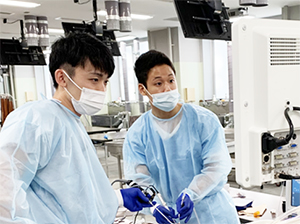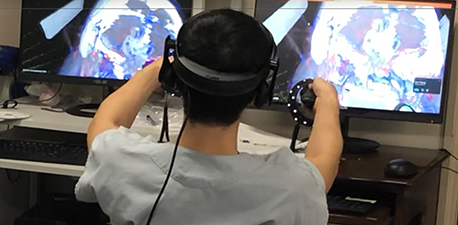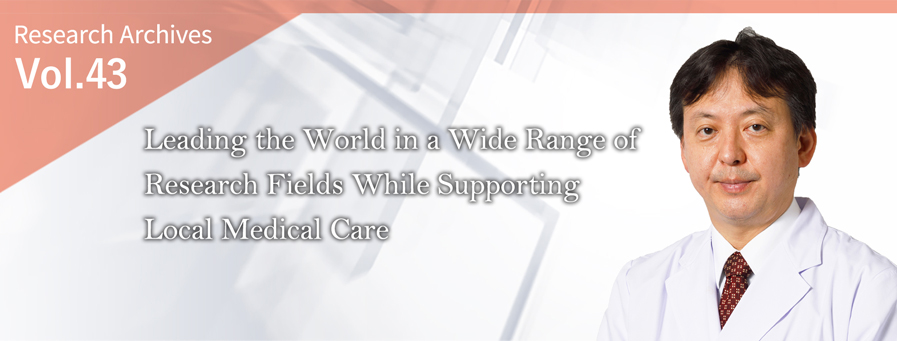
Department of Neurosurgery, Graduate School of Medicine, Hokkaido University
Miki Fujimura M.D., Ph.D.Specialized
Medicine
Academic & Professional Experience
- -1994 : Tohoku University School of Medicine (M.D)
- 1994- : Department of Neurosurgery, Tohoku University
- 1997 : Postdoctoral fellow of Neurosurgery, UCSF (Prof. Pak H. Chan)
- 1997-1999 : Postdoctoral fellow of Neurosurgery; Stanford University(Prof. Pak H. Chan)
- 2000 : Ph.D. (Tohoku University Graduate School of Medicine)
- 2003-2008 : Assistant Professor, Department of Neurosurgery, Tohoku University
- 2008-2011 : Chief of Cerebrovascular Surgery, Kohnan Hospital (Sendai)
- 2011-2013 : Director, Department of Neurosurgery, Sendai Medical Center
- 2013-2014 : Lecturer, Department of Neurosurgery, Tohoku University
- 2014- : Associate Professor, Department of Neurosurgery, Tohoku University
- 2015- : Vice Chairman, Department of Neurosurgery, Tohoku University
- 2017-2020 : Director and Chairman, Department of Neurosurgery, Kohnan Hospital, Sendai
- 2021-Present : Professor and Chairman, Department of Neurosurgery,
Hokkaido University Graduate School of Medicine, Sapporo
Clinical research that can be beneficial to society and basic research for the next 100 years
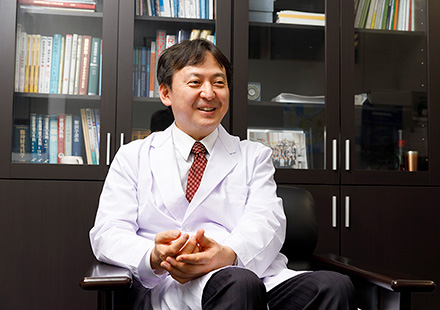
The Department of Neurosurgery at Hokkaido University is one of the oldest neurosurgery departments in Japan, established in 1965 by Professor Mitsuo Tsuru, the first chair of the department. Professor Miki Fujimura became the fifth chair in 2021. Having inherited the traditions of the department, he is engaged in extensive neurosurgical practice, research, and education.
“Our mission is to conduct research and education with a view to medical care 100 years from now, and to take responsibility for the medical care of Hokkaido as a whole as a regional university. Our research themes are also based on this perspective. For example, for common diseases such as stroke, we conduct research and development of new treatment methods to solve conventional problems, while for rare and intractable diseases, we take advantage of the comprehensive capabilities of Hokkaido University to unravel the mysteries behind them and develop treatment methods. Furthermore, we use the latest technology and ICT to advance diagnosis and treatment from a social aspect. Approaching the problem from various angles is the direction our department aims to take,” says Professor Fujimura.
Particularly noteworthy is the research and development of regenerative medicine for cerebral infarction. Since 2001, the laboratory has conducted research using autologous bone marrow stromal cells (BMSCs) manufactured from the patient’s own bone marrow [1] for patients with severe paralysis due to cerebral infarction, and since 2017, it has conducted Research on Advanced Intervention using Novel Bone marrOW stem cell (RAINBOW): Phase I, open-label, uncontrolled, dose-response trial of autologous bone marrow stromal cell transplantation in patients with acute ischemic stroke (research representative: Kiyohiro Houkin, President of Hokkaido University) with the support of the Research Project for Practical Applications of Regenerative Medicine of the Japan Agency for Medical Research and Development (AMED). Professor Fujimura says, “In Phase I, we investigated the safety and efficacy of a treatment that regenerates damaged brain tissue using a special technique in which autologous bone marrow stromal cells are injected directly into the brain. As a result, we obtained results such as safe intracerebral administration to stroke patients with severe paralysis and recovery of physical functions. All Phase I trials were completed in April 2021, and we plan to proceed with research and clinical trials with the goal of commercialization in 2029.”
With regard to designated incurable diseases, research is being conducted on moyamoya disease, which is a cause of stroke in children and young adults. Clinical research focuses on themes directly related to improving treatment outcomes. Basic research is also being conducted on the application of cell transplantation therapy to severe cases, for which there is currently no effective treatment.
In ICT medical collaboration for stroke, early diagnosis of acute stroke and medical collaboration using the ICT medical app Join (Allm Inc.) is already being used in actual clinical practice. In 2022, the Division of Stroke and Cardiovascular Disease ICT Medical Cooperative Research (endowed research division) was established to promote clinical research with applications in a wide range of areas such as telemedicine, work style reform, and AI diagnosis in Hokkaido.
A research and education environment where diverse professionals can demonstrate their abilities
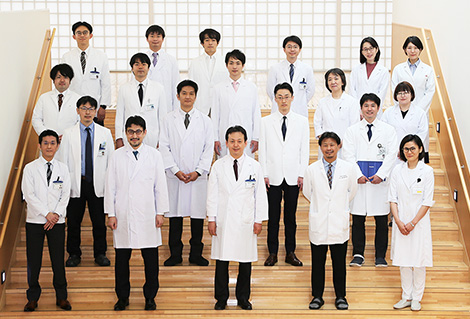
The department, which conducts research in a wide range of fields, has numerous research groups and a diverse membership. Professor Fujimura says, “In the department, there are not only highly skilled physicians who perform difficult surgical procedures but also researchers who can flexibly approach various issues based on scientific thinking as well as people who can demonstrate leadership to the world, people who are skilled in their ability to serve as a contact point for joint research with companies, and other people with a variety of abilities and aptitudes. Recently, emphasis has also been placed on the efficient application of research results within a limited budget and schedule, and we strive to ensure that research can be conducted quickly by utilizing the strengths of our diverse human resources.”
The department has renewed its residency program, proposing a variety of career paths so that they can steadily learn neurosurgery based on solid technical skills and neuroscience in four years. The new program offers multiple courses that allow for clinical and research planning to fit any career plan. In the past, after two years of initial training, it took about four years to become a senior resident, and in that case, entry into graduate school would be in one’s thirties or later. For those who wish to pursue a career in research more quickly, the department offers a wide variety of courses that allow for both a degree and a specialist program.
Making presentations at overseas academic conferences, writing papers in English, and studying abroad are encouraged, and short-term study at other domestic facilities to learn new surgical techniques are also supported.
Professor Fujimori says, “Many of the students in our department are from outside of Japan, and we are enjoying creating a new and more diverse environment. I hope that as many like-minded people as possible will join us in creating the future of the Department of Neurosurgery. I am committed to managing the department to ensure that more and more of its members will become leading neurosurgeons, medical professionals, and researchers around the globe.”
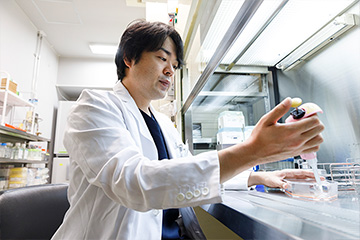
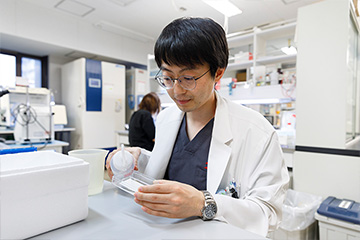
(Interviewed in October 2022)
Seamless surgical education to improve skills
Pre- and post-operative conferences and intraoperative training play an essential role in the education of surgical skills. However, this alone does not make it easy to master highly difficult surgeries. In 2020, Hokkaido University Hospital established the Cadaver Lab (clinical dissection training room), a dedicated training room for surgical technique training using donor bodies (cadavers) and the development of medical equipment.
The department regularly offers the cadaver dissection course to provide students with hands-on training to experience complex three-dimensional dissections. It is also conducting joint research on virtual reality systems with Colorado State University in the U.S., and is working on efficient surgical education by performing surgical simulations based on actual patient image data.
